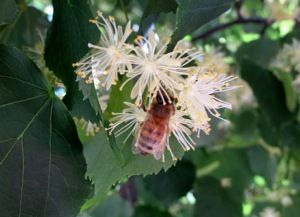News
Science News in Brief: Danish bees king of the hive for medical properties of their honey
This article is more than 7 years old.
In other news, DTU plans to unleash your inner hacker and Danish waters to be DNA mapped

Insects from Stenlille are the bee’s knees when it comes to fighting e-coli bacteria (photo: flickr/Kristine Paulus)
Recent research carried out by the University of Copenhagen and the Zealand Research Hospital in Roskilde has revealed that the anti-bacterial properties of Danish honey are superior to those in the medicinal honey from New Zealand currently used by the health service, DR Nyheder reports.
Honey contains an enzyme that converts sugars into hydrogen peroxide and that has anti-bacterial properties that enable it to be used to assist healing after operations such as plastic surgery.
The researchers compared a number of different Danish honeys with medicinal Manuka honey from New Zealand. The Danish honey was more effective. One reason could be that during production, a lot of honey from abroad is heated, which gets rid of the hydrogen peroxide. Danish beekeepers tend to put their honey in jars directly without heating it.
According to the researchers, the best honey tested was from Stenlille in mid-Zealand and was made from lime tree blossom. Among other things it was able to kill e-coli bacteria, which the Manuka honey could not.
Learn hacking at DTU
The Technical University of Denmark (DTU) has opened a new laboratory so that students can learn the dark art of hacking. However, it is all in the cause of improving cyber security. To mount an effective defence against cyber crime you have to think like a hacker, the university says. “Hackers often think obliquely and a bit out of the box when it comes to finding holes in security systems,” said associate professor Christian Damgaard Jensen, who is responsible for the new course. Students will learn how to break into security systems such as smartdoor locks, loudspeakers and other items connected to the Internet of Things. “There’s a need to understand security in physical installations because apparatuses create more doors for hackers and consequently more vulnerability,” said Jensen.
Danish seas to be DNA-tested
A new three-year project entitled ‘Coast sequencing – environmental DNA’ sponsored by the Velux Fund to the tune of 7.5 million kroner aims to map all maritime life swimming round the 8,000 km Danish coastline, reports Videnskab.dk. The project will start in October this year and aims to register everything from microscopic bacteria to whales. “You don’t give it much thought, but you’re actually swimming around in DNA from all sorts of Danish fish – and there is a lot more DNA than we thought until recently,” said associate professor Philip Francis Thomsen from the institute of bioscience at Aarhus University. The DNA will be collected through water samples filtered to retain DNA residues, together with samples of residues on the seabed. Among other things the knowledge gained can be used to keep track of Denmark’s biodiversity and spot new species arriving in Danish waters.
Diabetic alternative to Viagra on the way
In 2016, two Danish researchers from the department of biomedicine at Aarhus University started their own company, Initiator Pharma, to work on an alternative to the erectile dysfunction drug Viagra. Their research and trials have been so promising that today the company has a stock market value of around 65 million kroner. The new drug is specially designed for people with diabetes who more often have erectile problems than non-diabetic men. Viagra is not effective in 30-40 percent of cases involving diabetics and the only existing alternative is an injection into the penis that is painful and can cause scarring. Clinical trials for phase 2 of the development process will start next year, and if these are successful, the researchers plan to either find a new partner or sell the company.










































